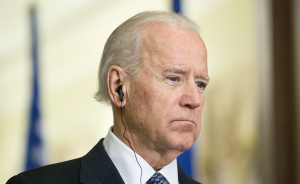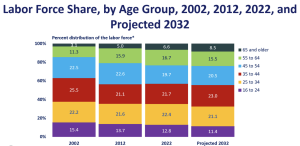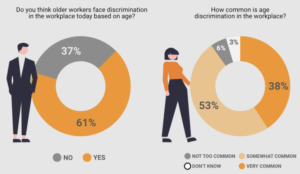UK prime minister, Harold Wilson wasn’t wrong when he famously said – some 60 years ago now – that ‘a week is a long time in politics.’
In a matter of moments, positions of apparent strength can seemingly melt away, and nowhere is this being seen right now with embattled president, Joe Biden.

The last few weeks have been nothing short of bruising.
From the disastrous election debate with republican candidate, Donald Trump, to vocal calls from democrats (and Hollywood royalty) urging him to stand down – a bad few weeks was capped off last Thursday, when Biden introduced President Zelensky as “President Putin” at the closing address of a NATO summit.
In a later press conference on the same day, he then called his own Vice-President, Kamala Harris, “Vice-President Trump.” The BBC described the moment as a “painful faceplant in front of a national television audience.”
According to many commentators, it suddenly seems possible that the very nomination of Biden to stand for another four years (due to be official confirmed during next month’s Democratic National Conference), could be in the balance – with mounting calls for him to stand aside.
The New York Times now has its own page dedicated to listing the growing number of democrats that have publicly said he should step down; expressed concern at his continued insistence to run, or who fully back him.
Age concern or ageism?
At the heart of the matter – it seems – is his age and, associated with this, his cognitive abilities – both now and for another four years.
The 81 year old is already America’s oldest president, and apparent lapses in concentration and his occasional difficulty stringing together cogent sentences is a worrying sight to see.
Many now believing he is not fit to hold the highest position until 2028.
But is this actual concern, or ageism?
Last week, we reported how 4 million ‘Baby Boomer’ Americans will hit retirement age this year and every year until at least 2027.
The generation that Biden belongs too are reaching an age where they are naturally want to check-out of the workforce.
And yet, like Biden, there are plenty that don’t want to – and yet when they vowel to carry on clear and obvious ageism seems never far away.
According to Rose Fass (herself 75), the co-founder of business transformation firm fassforward Consulting Group, recent press coverage of Biden is proof that ageism (despite being illegal), shows no sign of going away.
In fact, she believes it’s actually starting at an even earlier age – hitting some people in the 40s-50s.
And yet, as she points out, all the evidence suggests that older people will be the dominant age-group – with experts saying more than half of the working population in America is already over 40 (see below):

Source: Bureau of Labor Statistics
So, does America still have a problem with people getting older, and should CHROs embrace experience, and older people’s willingness to reskill instead of marginalizing them?
TLNT sat down with Rose for an exclusive chat:
Q: You’re 75 years-young with more than 50 years’ business experience behind you, and you say you’re not stopping soon. Is corporate America missing out on the talent of older people?
A: “Unfortunately I think it is. I’ll never forget walking into the HQ of Gartner, when I was 49, overhearing the CEO at the time saying how excited he was because he’d brought in lots of people. The main attribute he seemed to be highlighting was that these people were ‘young’. Fast forward to today, and I still think very little has changed – and arguably that things have gotten worse, because there’s this assumption that young people are the fresh-faced digital natives. But that just seems to ignore the fact older people are just as savvy too. I don’t see us as having a multigenerational workforce. We just have a digital workforce – once that includes us all. But I don’t think that’s how organizations see things.”
Q: What’s the impact of this attitude?
A: “I’m definitely seeing people being ‘aged-out’ of the workforce and their careers – even people in their 50s now. This isn’t right. Just think of all the institutional savviness and experience that this older generation have that the young don’t. I now believe that when we have conversations about diversity, they must also include conversations about how to accommodate, and take advantage of the needs of older people who want to stay working later into their lives. I personally don’t feel any less energetic then I did in my 30s or 40s. I think organizations say that older people don’t want to up-skill as an excuse, because most ‘do’ want to keep learning and developing.”
Q: You say ageism is occurring earlier now? How so?
A: “Ironically, I’m actually seeing some ageism from older, senior leaders, against their middle managers. They’re being made to ‘feel old’ by their senior leaders. It’s happening because I believe senior leaders think executives will push back against them, while younger employees are more compliant, and can be told what to do more. Also, organizations seem to want to have the ‘cool factor’ of a young leader, because it’s good for their brand image to be seen to be led by someone in their 30s-40s than in their 50s or 60s.”
Q: What do you see as the biggest dangers of ageism?
A: “There’s obviously loss of institutional memory that older workers have, but there’s also the loss of diverse points of view. Diversity of thought is critical to how we get to a place of better positivity.”
Q: Is there a greater pressure on older people to prove themselves to be relevant or able still?
A: “Without doubt. Unfortunately, not everyone ages at the same rate – and for some the impacts of aging do appear quicker. Trump clearly has a better level of stamina and energy than Biden, even though Trump himself is only a few years younger. I definitely think older people have to ‘prove’ themselves harder; they have to look more vital and energetic. I know it to be the case that certain corporations won’t hire people of a certain age. It’s illegal, and it’s hard to prove, but it still exists.”
Q: What does HR have to do then?
A: “They need to stop being so influenced by their bosses! HR puts too much emphasis on recruiting for ‘young talent’, and so HR skills are being driven in that direction too. I don’t think there’s a real realization of the actual demographics of this country. I say there’s nothing to be ashamed about in being older. I’m excited to be in my wisdom years. I think individuals who are older do need to be prepared to know when to step away if they’re no longer capable, but if they are, then more organizations should embrace them.”
Ageism – the stats:
An AARP survey of 3,900 individuals aged 45 and older found two out of three employees claimed they had witnessed or experienced ageism at work.
Among the 61% of respondents who reported age bias, 91% believe such discrimination is widely practiced.

Source: https://executiveresumewriters.com/ageism-in-the-workplace/
